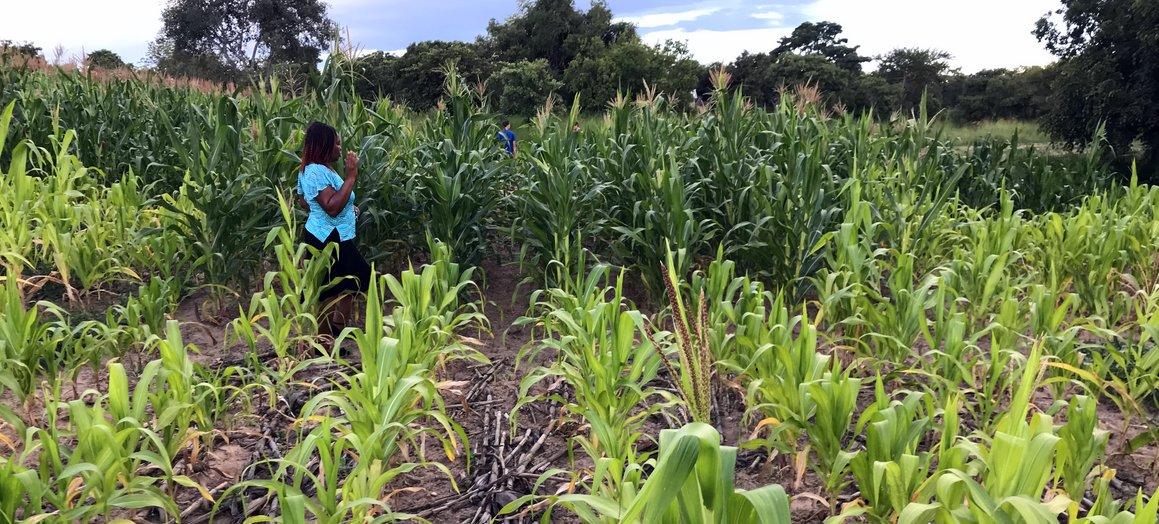
- CIRAD at the 2024 Paris International Agricultural Show
- Paris International Agricultural Show website
- Article : Food sovereignty in Africa: how can we produce more, and better?
27 February 2024. Conference: "How can we manage soil fertility to boost food sovereignty in Africa?"
- By means of three presentations and a round table, the conference will highlight the global issues surrounding soil fertility maintenance.
- In particular, it will examine the use of mineral fertilizers in addition to agroecological practices to boost food production in Africa.
Part 1: Global issues and soil fertility
- Presentation 1: Food security in Africa remains an important issue - by Alain Sy Traoré, Director of Agriculture and Rural Development, ECOWAS;
- Presentation 2: Soil fertility is the backbone of agricultural production by Tantely M. Razafimbelo, University of Antananarivo, Madagascar.
Part 2: Is using fertilizers compatible with agroecology?
Presentation 3: Use of mineral fertilizers in addition to agroecological practices to boostagricultural production in Africa - by Gatien Falconnier, CIRAD researcher based in Harare, Zimbabwe
He presented his research: Falconnier et all (2023) The input reduction principle of agroecology is wrong when it comes tomineral fertilizer use in sub-SaharanAfrica #16 p.
More mineral fertilizer is
needed in SSA for five reasons:
- the starting point in SSA is that agricultural production is “agroecological” by default, that is, very low mineral fertilizer use, widespread mixed crop-livestock systems and large crop diversity including legumes, but leading to poor soil fertility as a result of widespread soil nutrient mining,
- the nitrogen needs of crops cannot be adequately met solely through biological nitrogen fixation by legumes and recycling of animal manure,
- other nutrients like phosphorus and potassium need to be replaced continuously,
- mineral fertilizers, if used appropriately, cause little harm to the environment, and
- reducing the use of mineral fertilizers would hamper productivity gains and contribute indirectly to agricultural expansion and to deforestation.
See also article: 04/10/2023 In sub-Saharan Africa, mineral fertilization and agroecology are not incompatible
Round table
- Mehdi Filali Senior Vice president West Africa OCP Morocco
"In Ethiopia the soil fertility map has allowed us to fine tune the fertilizer use" - Nathalie Bogui Ivory Coast, Member Conseil d'Administration @West and Central Africa Network of Agricultural and Rural Advisory Services (RESCAR-AOC), Conseiller Technique @ National Agency for Rural Development (ANADER)
- Guy Faure INTPA, F.3
He referred among others to ProSoil (2014 to 2027): A Global Soil Conservation and Rehabilitation Programme to Promote Food Security Selected partner countries are assisted in the widespread implementation of agroecological approaches that conserve soil and rehabilitate infertile soil in climate-smart, environmentally friendly ways.
(EC invests 10 million Euro in soil fertility in East Africa)
"Bio waste (including urine and faecalis) from cities can contribute up to 30 % of bio fertilizer needs"
All presentations and discussions were in French only.
Related: 28/02 La Grande Muraille verte face aux défis de la diversité des terroirs sahéliens
Alors que la Grande Muraille Verte a fixé des objectifs ambitieux à horizon 2030 – restaurer 100 millions d’hectares de terres dégradées, séquestrer 250 de tonnes de CO2 et créer 10 millions d'emplois dans les zones rurales – ce side event a demontré la complémentarité de l’ensemble des acteurs pour y parvenir et l’importance de créer des conditions favorables à leur coopération. Il a rassemblé plusieurs expertises et exemples opérationnels en donnant la parole à différents acteurs (institution publique, recherche, ONG, collectivité territoriale).- Oumarou Malam Issa IRD Coordinateur Recherche, Expertises Scientifique et savoir pour la Gestion Durable des Terres et des Territoires de la Grande Muraille Verte (IRN RESET-GMV, 2023 - 2026)
- Maxime Thibon IFAD, Spécialiste Climat et Environnement, Division environnement, climat, genre et inclusion social
- Remi Hemeryck, Delegué general SOS Sahel Sénégal
- Sandra Rulliere, Responsable adjointe de la Division Agriculture Développement rural et Biodiversité, AFD
- Philippine Dutailly Rédactrice désertification et dégradation des terres, Sous-direction de l'environnement et du climat, Direction des Affaires globales, Ministere de l'Europe et des Affaires Etrangeres, France.
Related PAEPARD blogpost:
25 May 2023. Accelerating the Great Green Wall: fostering the Africa-Europe partnership for a just rural transformation in the Sahel29/02 Manure for maintaining soil fertility and sequestering carbon
Manure is an essential organic resource for maintaining soil fertility and sequestering carbon. In tropical conditions, this resource is increasingly commercialized. The agroecological transition must make it possible to promote these complementarities between crops and livestock. This side-event illustrated this theme through concrete cases drawn from the activities and partnerships of AFD and CIRAD.





No comments:
Post a Comment